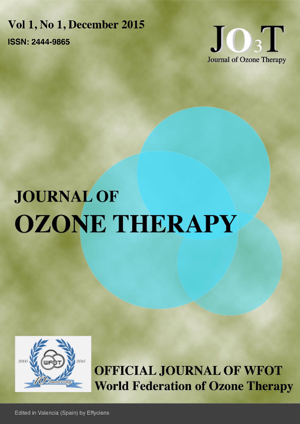In vitro effect of ozone in phagocytic function of leucocytes in peripheral blood.
DOI:
https://doi.org/10.7203/jo3t.1.1.2015.10627Keywords:
ozone, immune modulation, oxidative metabolism, biochemical reaction, immunity mechanism, phagocytic function Abstract
Abstract
Introduction.
The ozone immune modulation is based on its effect on the immune system and oxidative metabolism. When whole human blood is exposed to the appropriate ozone doses, we can observe in the cells different biochemical reactions that in turn are able to improve the immunity mechanism.
Objectives.
The aim of this experimental study was to evaluate the effect of ozone on blood phagocytosis.
Methods.
Blood samples of 30 mL were taken from five healthy male blood donors in the morning, and were subdivided in 6 glass tubes of 5 mL each (control, oxygen and 4 ozone groups). A volume of 5 mL ozone/oxygen mixture at different ozone concentrations (10, 20, 40 and 80 µg/mL) was collected with glass syringes. There after the gas was immediately bubbled in the blood samples. Syringes were slowly but continuously mixed in shaker with stirring, during 10 min allowing a complete mixing of the liquid–gas phases with minimal foaming. Two of the above blood samples were used as controls: the first sample blood and the second blood treated with oxygen only. Phagocytic cell function was assessed by direct microscopic Baehner method. The results were analyzed by paired T test; significance was defined as a value less than 0.05.
Results.
After ozonation, phagocytic function increase with significant differences in comparison with controls groups (p=0.04). Respect to the ozone concentrations, the phagocytic function increased at 20 µg/mL and even more at 40 µg/mL, but decrease with 80 µg/mL. However, there were no significant differences in phagocytic function in the blood exposed to 10 µg/mL in comparison with controls.
Conclusion.
Ozone may stimulate the phagocytic function of the peripheral blood cells in a dose-dependent fashion.
 Downloads
Downloads
 References
References
- Travagli V, Zanardi I, Silvietti A, Bocci V. Physicochemical investigation on the effects of ozone on blood. Int J Biol Macromol 2007; 41: 504–511.
- Bocci V, Zanardi I, Travagli V. Ozone acting on human blood yields a hormetic dose-response relationship. J Transl Med 2011; 9:66
- Larini A, Bocci V. Effects of ozone on isolated peripheral blood mononuclear cells. Toxicol in Vitro. 2005; 19: 55–61.
- Sagai M, Bocci V. Mechanisms of Action Involved in Ozone Therapy: Is healing induced via a mild oxidative stress? Med Gas Res 2011; 1: 29
- Bocci V, Zanardi I, Travagli V. Oxygen/ozone as a medical gas mixture. A critical evaluation of the various methods clarifies positive and negative aspects. Med Gas Res 2011; 1: 6.
- Menéndez S, González R, Ledea OE, León OS, Hernández F, Díaz M. Ozone therapy. Basic aspects and clinical applications. Havana, Cuba: CENIC; 2008.
- León OS, Menéndez S, Calunga JL, Viebahn R. Ozone oxidative postconditioning reduces oxidative protein damage in patients with Disc Hernia. Neurol Res 2012; 34(1):59-67.
- Li Q, Verma IM. NF–kB regulation in the immune system. Nature Rev Immunol 2002; 2: 725–734.
- Bocci V. Ozone as a bioregulator pharmacology and toxicology of ozone today. J. Biol Regul Homeost Agents 1996; 10:31-35.
- Fukunaga K, Nakazono N, Suzuki T, Takama K. Mechanism of oxidative damage to fish red blood cells by ozone. IUMB Life 1999; 48: 631–634.
- Diaz S, Gonzalez Y, Prieto EA, Azoy A. A genotoxic effect of ozone in human peripheral blood leukocytes. Mut Res 2002; 517: 13–20.
- Volkhovskaya NB, Tkachenko SB, Belopolsky AA. Modulation of phagocytic activity of blood polynuclear leukocytes with ozonized physiological saline. Bull Exp Biol Med 2008; 146(5):559–561.
- Abbas AK, Lichtman AH, Pober JS. Molecular and cellular immunology. Seven ed. Barcelona: Elsevier; 2012.
- Aderem A. Underbil DM. Mechanism of phagocytes in macrophages. Ann Rev Immunol 2009; 170:553-623.
- Locke BA, Dasu T, Verbsky JW. Laboratory Diagnosis of Primary Immunodeficiencies. Clinic Rev Allerg Immunol 2014; 46:154–168
- Ronald JH, Giclas PC. Diagnostic Immunology Laboratory Manual. New York, USA: Raven Press; 1991.
- Larini A, Bocci V. Albumin is the most effective antioxidant during human plasma and blood ozonization. Riv Ital Ossigeno– Ozonoterapia 2004; 3: 15–24.
- Bocci V, Borrelli E, Travagli V, Zanardi I. The ozone paradox: ozone is a strong oxidant as well as a medical drug. Med Res Rev 2009; 29: 646-82.
- Travagli V, Zanardi I, Bernini P, Nepi S, Tenori L, Bocci V. Effects of ozone blood treatment on the metabolite profile of human blood. Int J Toxicol 2010; 29:165-74.
- Tducusin RJ, Kazu M, Sarashina T, Uzaka Y, Tanabe S, Otan.D Phagocytosis of bovine blood and milk polymorph nuclear leukocyte after ozone gas administration in vitro. J Vet Med Sci 2003; 65(4): 535-539.
- Díaz J, Sardiñas G, Menéndez S, Macias C. Immumodulatory effect of ozone in children’s with deficiency in the phagocytic activity. Mediciego 2012; 18(1).
Published
How to Cite
-
Abstract1244
-
PDF414
-
HTML754
Issue
Section
License
Journal of Ozone Therapy applies the Creative Commons Attribution-NonCommercial 4.0 International License (CC BY NC 4.0) license to works we publish.
Under this license, authors retain ownership of the copyright for their content, but allow anyone to download, reuse, reprint, modify, distribute and/or copy the content as long as the original authors and source are cited. No permission is required from the authors or the publishers.
You may not use the material for commercial purposes.
Appropriate attribution can be provided by simply citing the original article, provide a link to the license, and indicate if changes were made.
You may do so in any reasonable manner, but not in any way that suggests the licensor endorses you or your use.




